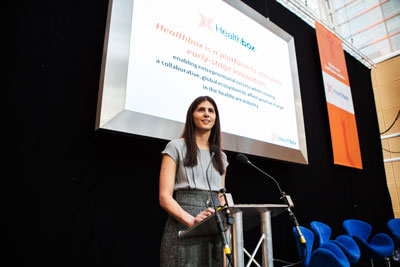
Healthbox CEO Nina Nashif speaks at the Innovation Day in London.
Just a year after launching its first class in Chicago, Healthbox held a demo day in London to showcase its first European class. The seven startups, representing four countries, which were announced in October 2012, have now completed Healthbox's three-month accelerator course. They were chosen out of an initial pool of about 200 applicants. Each company received some seed capital, access to a collaborative workspace in central London, and mentorship from Healthbox's European partners: global innovation company Bayer, international healthcare group Bupa, Guys' and St. Thomas' charity, and Serco Health.
"In Europe we have 27 different systems which restrain innovation, which keep investors out of the country. Nobody knows the exact environments and it's harder to investigate the risks," said Ben Heubl, the chapter founder of Health 2.0 Copenhagen, who was involved in facilitating Healthbox's Innovation Day. Heubl said accelerator programs in Europe are key to building the kind of multinational communities that encourage angel investors to look beyond their own countries and support the whole European health IT ecosystem.
Another European accelerator, HealthXL just had the first in a series of selection days in Dublin. HealthXL is a health-specific division of Startup Bootcamp, which Heubl described as the European equivalent of TechStars. The Irish accelerator will be focusing on later stage companies than Healthbox, he said, and will include partners like GlaxoSmithKline and IBM and mentors like O'Reilly Media founder Tim O'Reilly and Global Diagnostics founder Johnny Walker.
Here are the seven companies that featured at the Healthbox event in London:
HealthClinicPlus creates prescription software to guide patients through exercises and physical therapy at home. The Irish company is currently piloting their software at a London Hospital with post- and pre-operative patients. Their first consumer product, SportsClinicPlus for the sports industry market, is under development.
Similarly, Romanian company MIRA Rehab converts existing physical therapy exercises into videogames, currently for the Microsoft Kinect system, which sports a sensor the software can use to determine whether patients are really following through with exercises. MIRA won the Innovation Award at the event, which came with a £10,000 prize.
SOMA Analytics is a German company developing passive monitoring software for smartphones. Targeted at employee stress management, the software will measure voice affect and typing speed and errors to provide a realtime assessment of stress and wellbeing.
HomeTouch employs a software-as-a-service model for helping aging-in-place elders with busy families. The company's platform consists of two connected applications: a tablet app for older people which gives them easy access to services like messaging, video calling, calendars, and photo albums and a cross-platform app for families that lets them manage and help with that platform remotely. The software is currently in beta, with a full release planned for later in the year.
Portable Medical Technology, Ltd.
Irish company Portable Medical Technology, Ltd. makes ONCOassist, a smartphone app to help oncologists get fast and easy access to the latest research and clinical decision support tools. ONCOassist is one of the first European smartphone apps to get CE Mark clearance, according to the company.
Medopad is a tablet interface for hospital servers, allowing doctors to access a patient information without needing to consult a fixed terminal.
Desktop Genetics is developing the SynthBot, a gene printer that aims to make it easier and more affordable to create synthetic genes in the lab. The British company is currently beta testing the software and expects to be able to launch the SynthBot for construction by 2015.


















